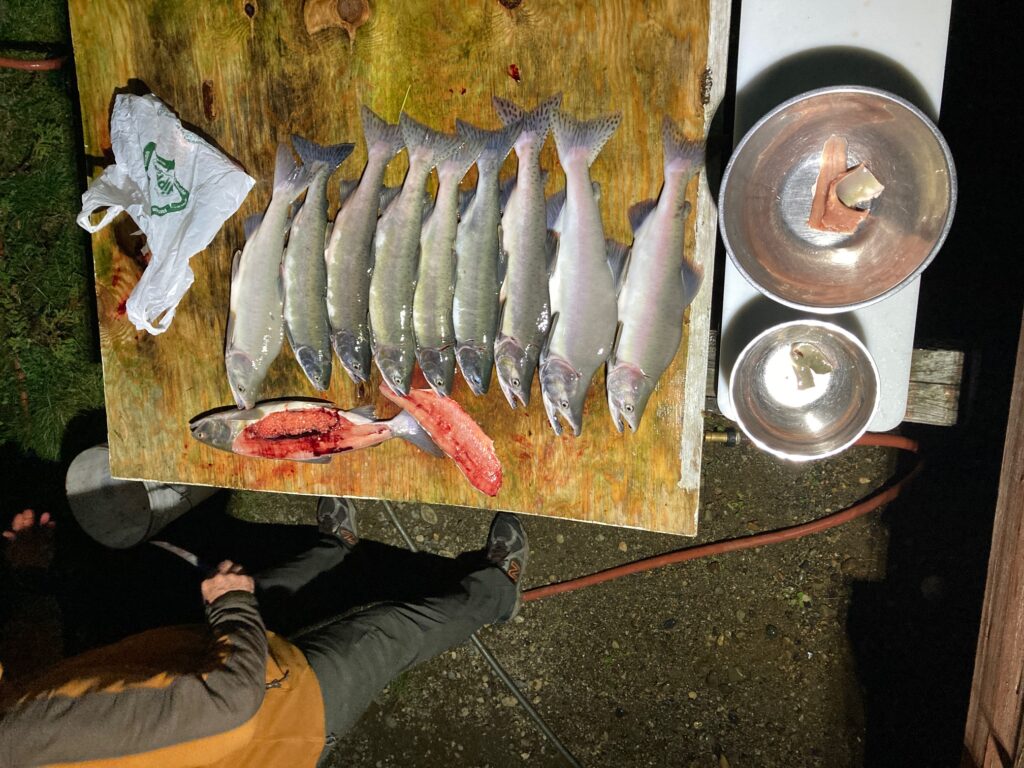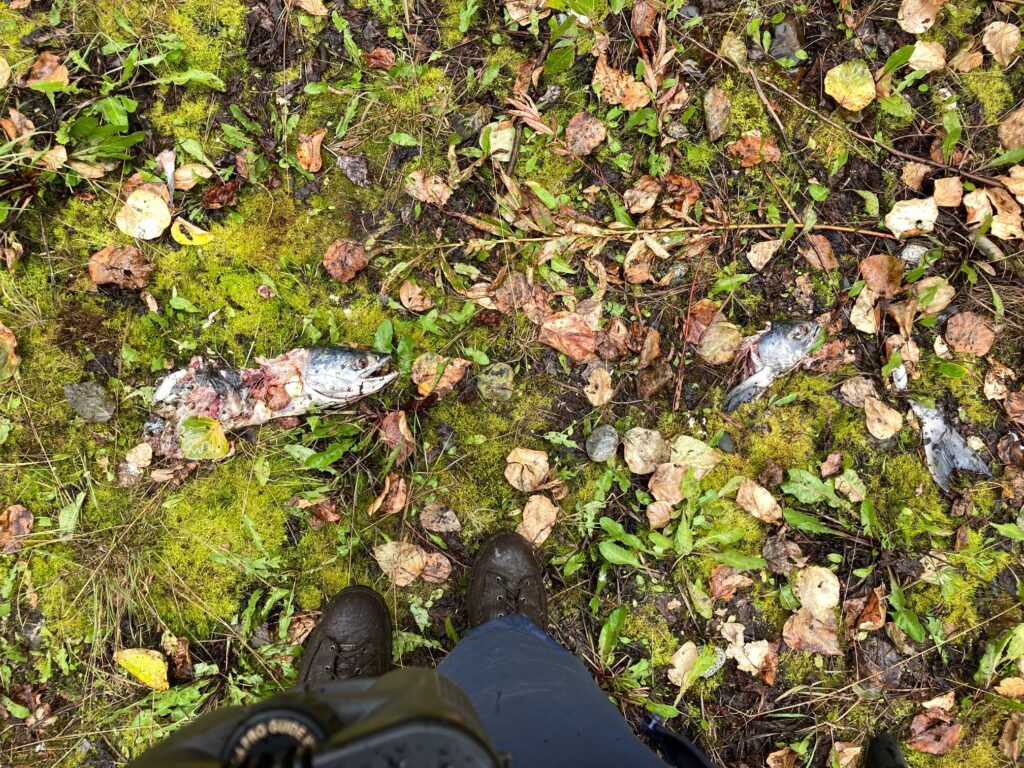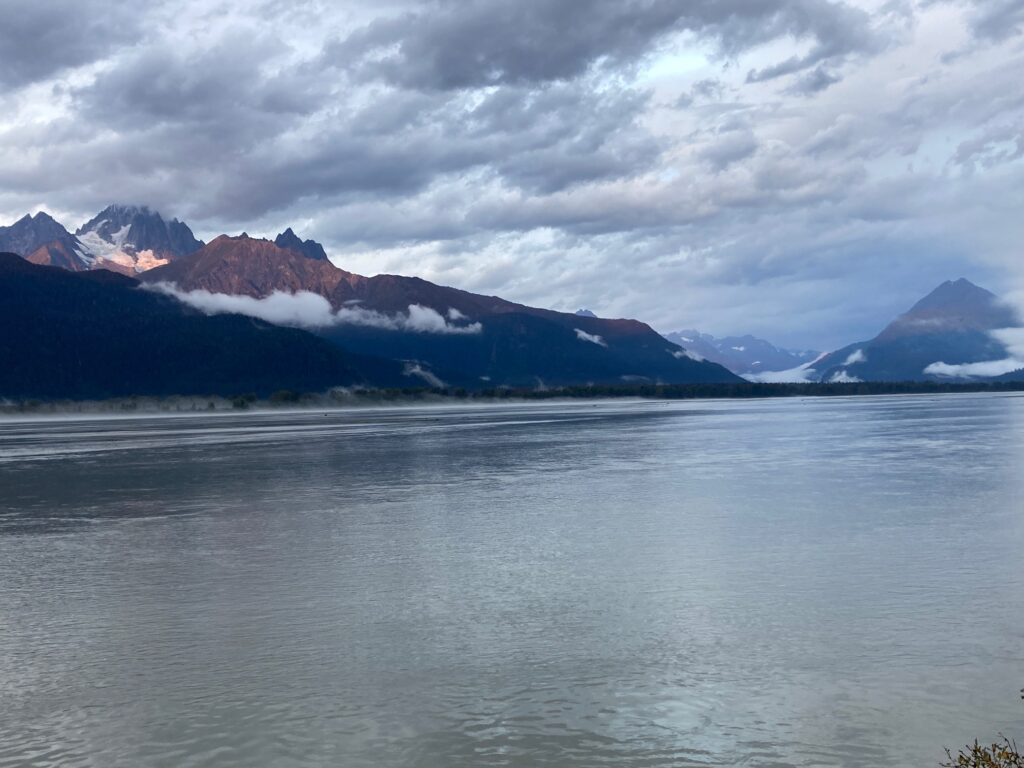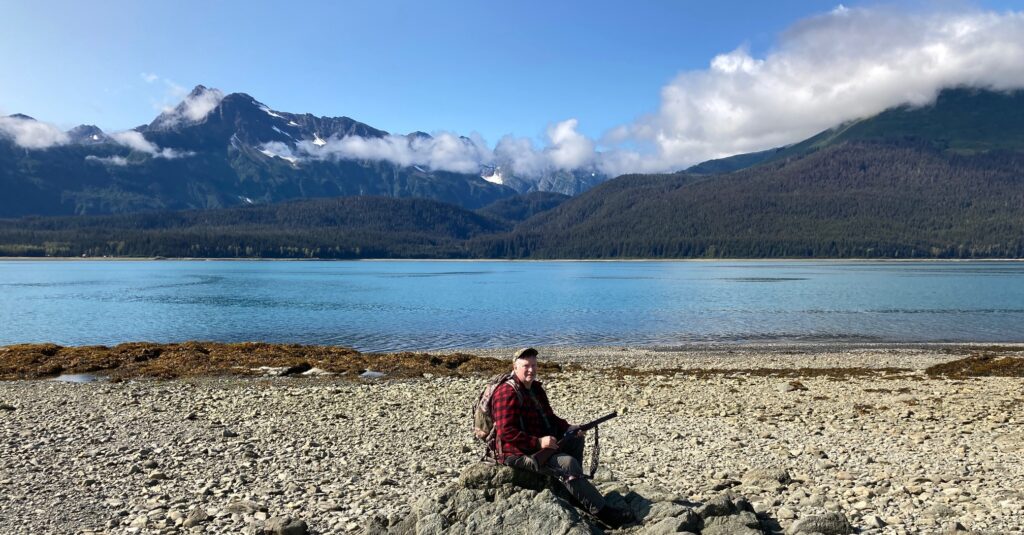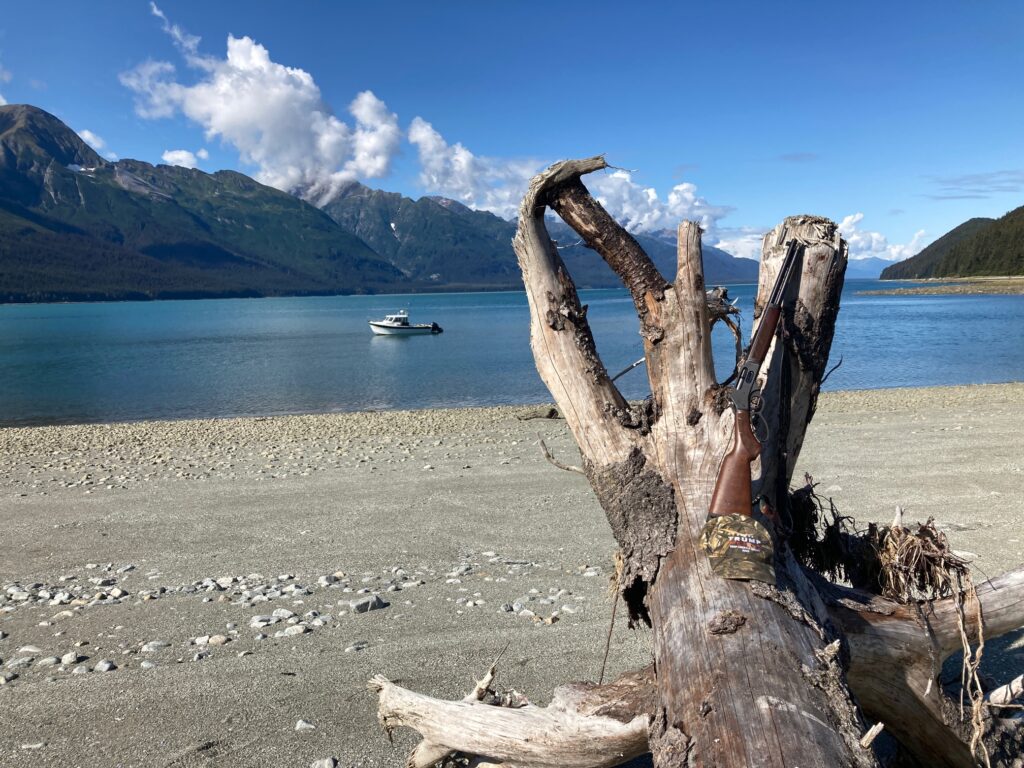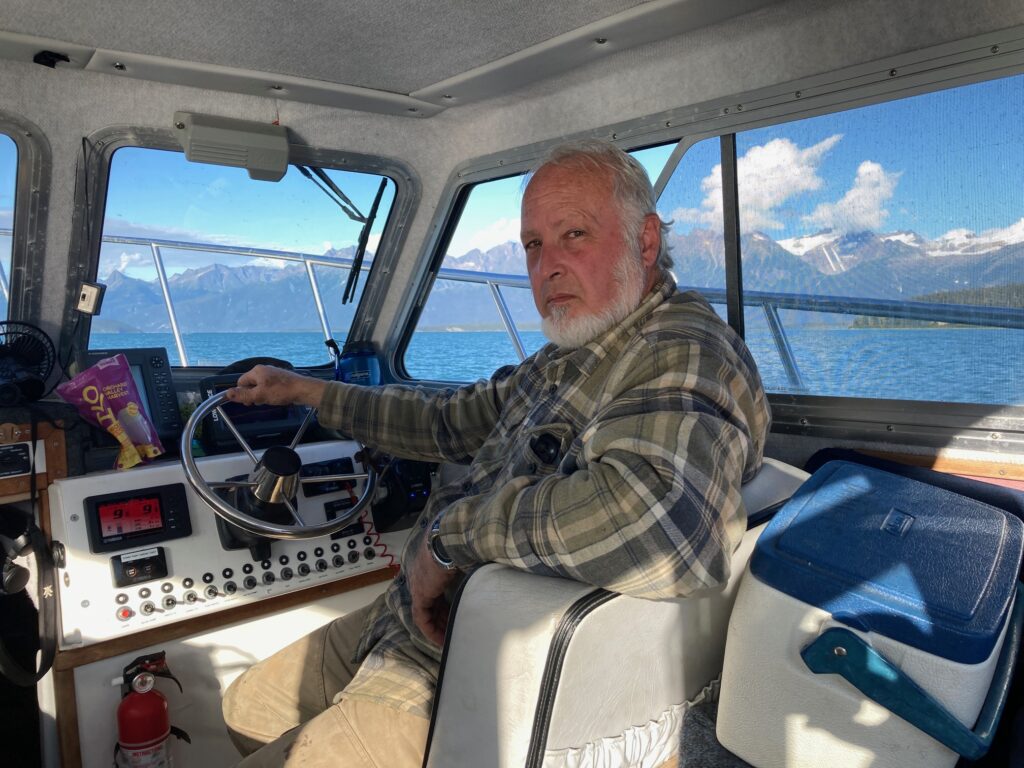Posts Tagged → hike
A thousand overnight tragedies
Normally, the smell of rotting fish is a signal to clean out the fridge or to leave the area you are in. It’s a universally bad smell, and no one normal wants to be around it. But it was a pervasive good sign where I happened to be standing, because it was associated with the freshly dead salmon heads and remains at my feet that had not been here the previous afternoon. A thousand individual tragedies had occurred along this stream bank overnight, as bears had picked muddy bank spots to grab spawning salmon and take them uphill where they could eat them without the fear of being ambushed by humans, or bigger bears.
We had hunted and fished along a roughly seventy mile vertical stretch of southeastern Alaska for over a week, and in addition to beginning to smell a little fishy myself, I had also saturated and possibly satiated a cavernous need inside me. It is an ever-present deep, clawing need that most wilderness seekers share, be they bikers, hikers, canoers, campers, photographers, fishers or hunters. Sorry, I am not going to quote Thoreau or Muir or Roosevelt on the tonics, joys, highs, or benefits of directly experiencing wilderness. My own wilderness pleasure is gained from simply not seeing a single other human being (except my hunting/fishing partner, when I have one) anywhere near where I am hunting or fishing. That unusual moment results in me feeling like I have better than average odds of achieving my goal, because I have the whole landscape to play without intervention.
On this trip, my “public” goal was a wolf, a blacktail deer, and/or a big black bear better than 300 pounds. Hides and skulls alone were going to come home with me. Edible meat was going directly into my buddy’s freezer. All of the many salmon I caught on the trip went into either my buddy’s smoke house, into his freezer, or into my stomach. It pleases me to report back that chum (dog) salmon directly out of the ocean taste damned good. It is also a fact that chum salmon do not keep well overnight, and that even halibut turn up their noses at it. I suppose freshly caught chum can be immediately canned, but given that there are usually better alternative salmon species to eat and can, I don’t see why a person would make this choice.
Incidentally, about those salmon: Alaska’s management of its salmon runs has been so good, so professional, so scientific, and so successful, that there is actually a glut of salmon in the streams and on the American market. Therefore, wild caught salmon prices are way down. A lot of commercial salmon boats were out netting, and the cannery we visited was in business, but with diesel fuel at about eight bucks a gallon there and salmon at eighty cents a pound, it’s hard to see how the netters will survive. But thanks to the Alaska Department of Fish & Game, the bears have plenty to eat before denning and hibernating for the long, cold Alaskan winter.
Goals are critical on a wilderness trip. Even stupidly simple ones. You have to have goals before you set out on a trip like this, or else you will wonder what the heck you were doing out there when you get back to civilization. My actual personal goal was simple: To fish and to hunt as much as I could, and this goal was easily met. On this trip, I was often able to do both hunting and fishing simultaneously: We slowly trolled salmon spoons behind the boat while glassing the shorelines for critters. A rubber dinghy towed in the backwash provided us the ship-to-shore transportation we needed. See a salmon stream that is calling your name? Go ashore and hunt it, and look for salmon-eating black bears to fill some tags; and look out for the griz. We saw a lot of griz.
Only saw wolf tracks in one very remote spot, and I passed up the one black bear I had a shot at. Only twenty feet across the salmon stream from me, he was either a genetic runt, an ancient-looking yearling, or maybe a female. Whatever kind of black bear he was, he was crabby enough to growl at me before shambling off to less crowded fishing spots. I wouldn’t shoot a bear that small in Pennsylvania, and I sure wasn’t going to fill my Alaska tag with it. Maybe I will go back for the spring bear hunt in 2024.
Despite fighting our way up into the interior of an island known to have blacktail deer, we saw none and feared the griz there more than we were willing to keep going after deer. Signs of griz were everywhere. I picked and popped high bush cranberry and high bush huckleberry while noting the increasing deer browse the farther in and higher I got. But it was a veritable jungle, and surprising a griz up here would mean my certain mauling, possibly my death, and so I decided to nicely frame my deer locking tag when I got home instead of risking life and limb to fill it. I headed back out and found Merlin asleep in the sunshine on the beach.
A loud thud on the bottom of the boat awakened me from my cramped sleeping position, and I rolled out of my sleeping bag onto the cabin floor, which was cluttered with gear and guns. Walking out onto the deck to look for the source of the thump, I saw a sea lion, a seal, and a pod of porpoises chasing salmon all around us in the early morning dimness. Mist rose from the water, and then the rosy tint of dawn’s first sunbeams lit up a nameless glacier high up in the crags across the water. I felt stoned on all this Mother Nature. Like I said, I was there just to hunt and fish, and whether or not I went home with the physically tangible results was not nearly as important as absorbing and sucking up the magic around me and filling that big, hungry, empty cavern in my soul. You just can’t have this magical experience without public lands, and some of that designated as wilderness. This, these, we had.
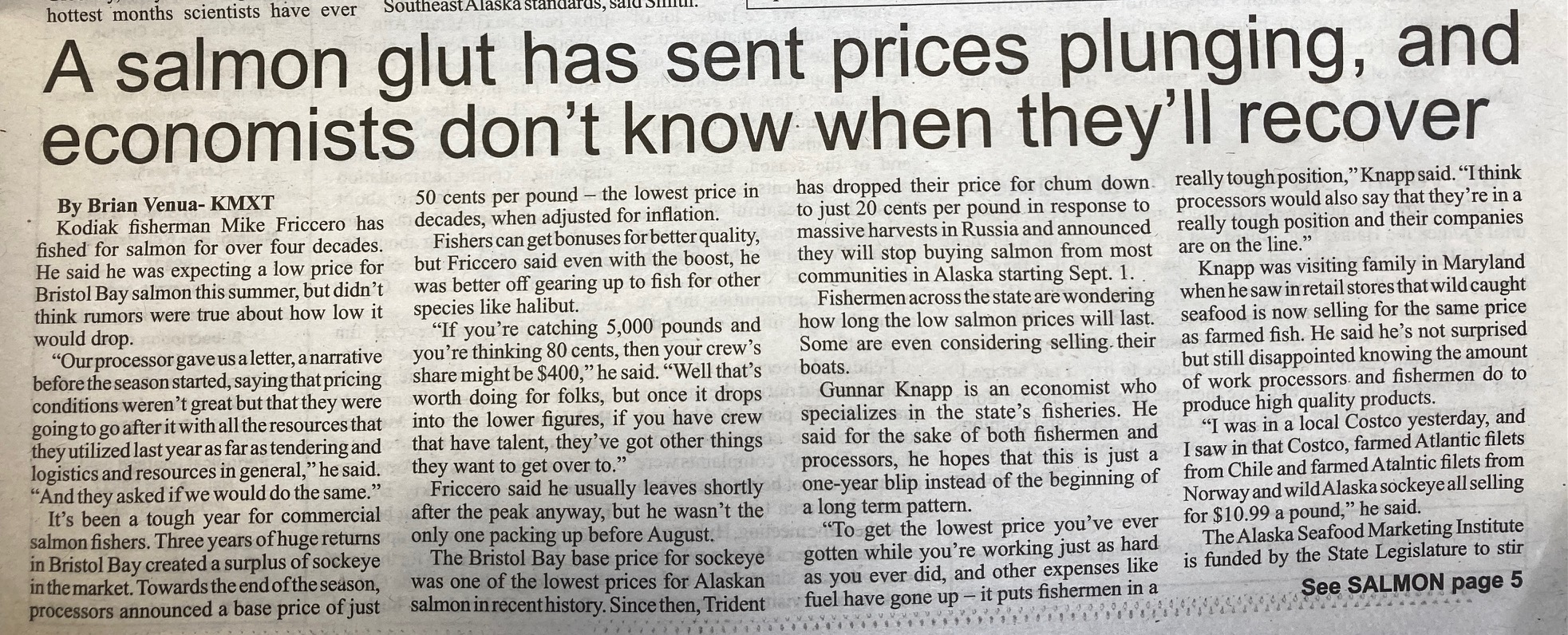
Alaskan salmon management has been so good that there are actually “too many” salmon, if there is such a thing
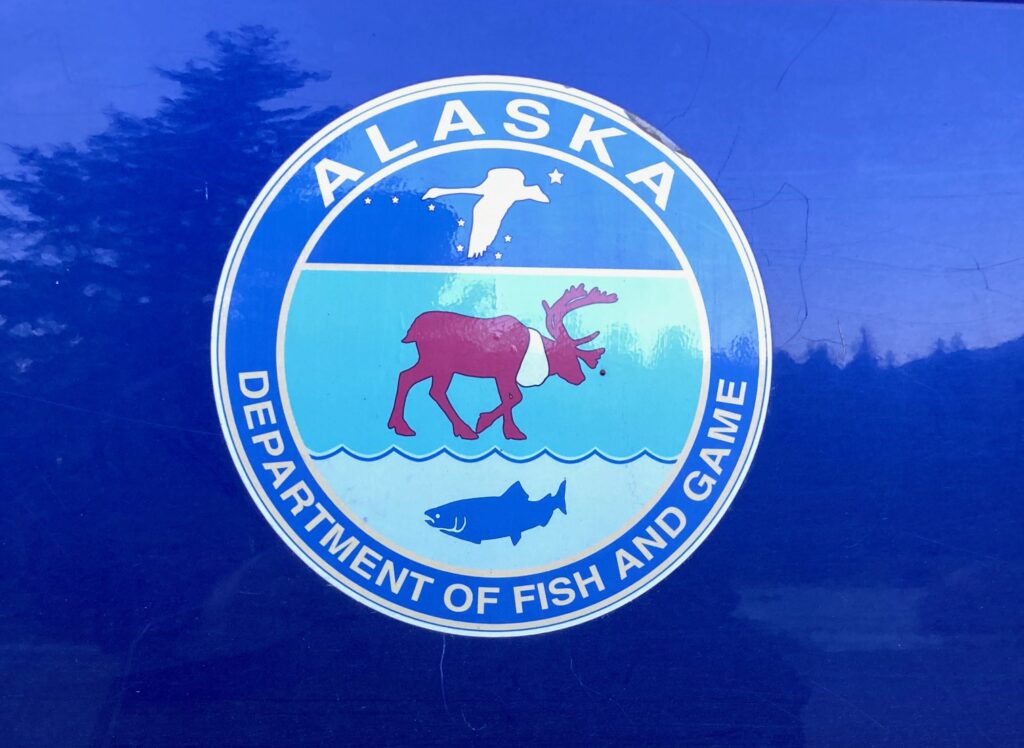
Reflected is the Chilkoot River, where we fished with the bears and a gaggle of international tourists following them up and down the river
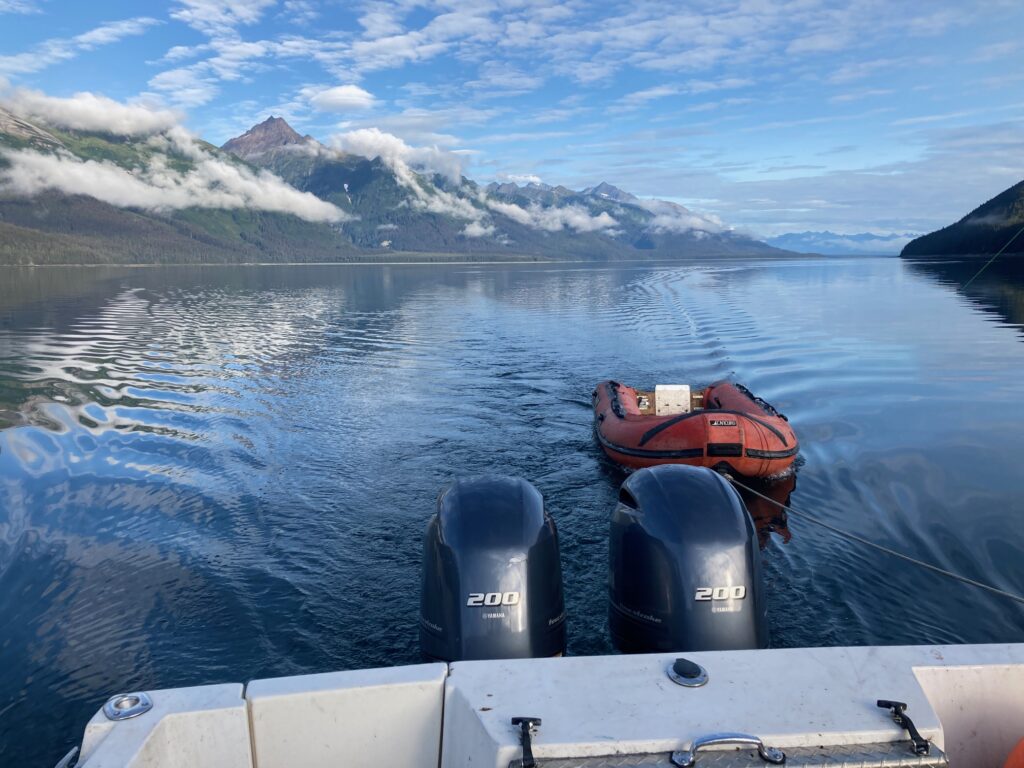
Trolling spoons for salmon, towing our dinghy, and glassing the shoreline for critters. This is hunting and fishing at the same time
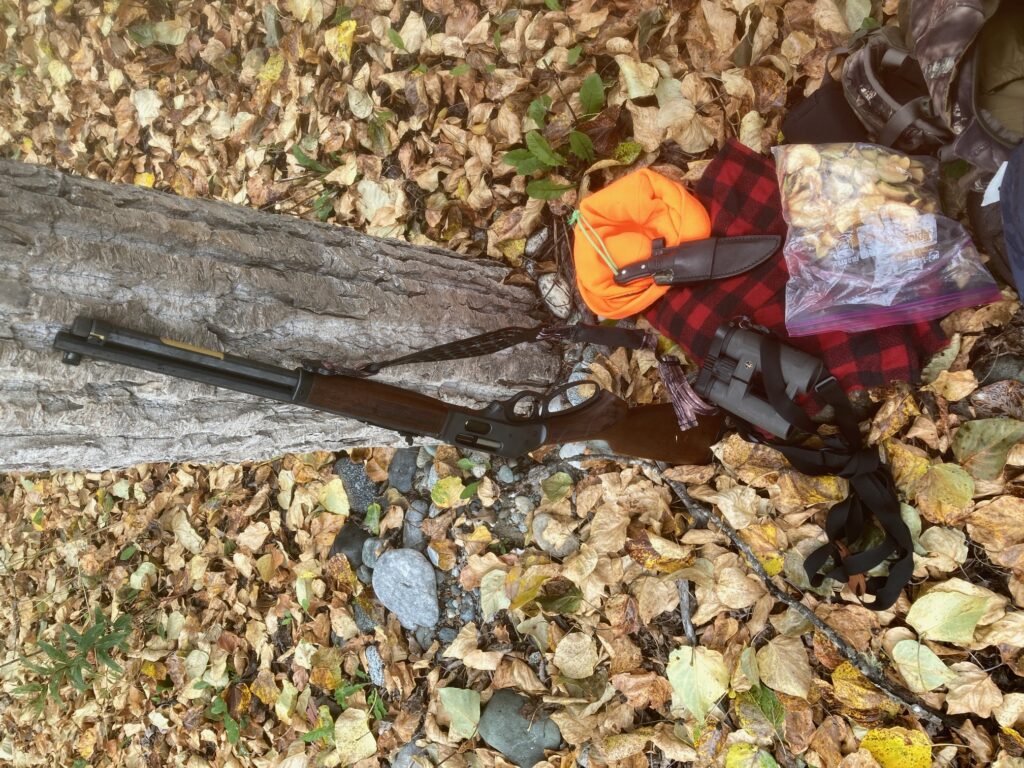
My hunting kit. A Henry 45-70 lever rifle (not crazy about the cheesy rear sight), a JRJ knife, rugged Leupold binoculars, home made dried fruit and jerky
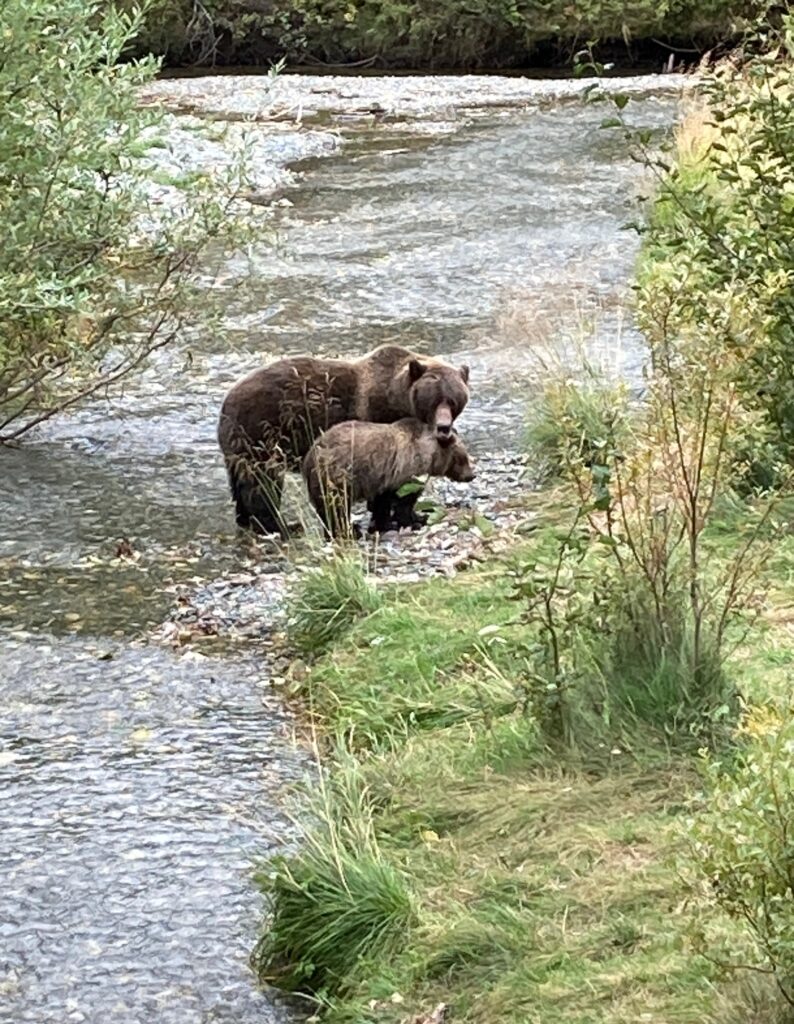
Grizzly sow and cub eating salmon as they spawn upstream from the Chilkat River. I saw a lifetime supply of griz on this trip.
Trump Great American Outdoors Act hits Conservation Home Run
Conservation is where I have spent my entire career, and it is where my heart resides day in and day out. So it is with great happiness that I see President Trump sign into law the Great American Outdoor Act, which will do the nuts and bolts environmental protection America needs, without the regulation that America does not need.
The fact that so many political appointees within the Trump Administration were cheerleaders for the GAOA says a lot about the political tenor there. So many people accuse the Trump Administration of being some kind of radical “right wing” blah blah, and the fact is that the entire administration is loaded with middle-of-the-road professionals, who hold a mix of political, philosophical, and ideological views. In past Republican administrations, there were plenty of appointees who would have blocked GAOA, or held it up. GAOA is a signature achievement for President Donald Trump, and it is a huge win for Americans.
GAOA fully funds the Land and Water Conservation Fund for the first time in a zillion years. It provides adequate funding for federal and state parks infrastructure updates, operations, and maintenance costs. These are the costs that are always deferred in every administration. It is a subject I wrote my master’s thesis on at Vanderbilt University, and it is a subject that has never gone away, until now: Federal recreational infrastructure has been woefully underfunded for decades. Many state parks across America are in even worse shape than that National Parks.
For example, in 2016 my teenage daughter and I hiked half of the Northville Placid Trail, which runs through the Adirondacks. At the end of our ninth day, as we waited out a looming thunderstorm in a rustic but comfortable lean-to deep inside designated wilderness, on a hike in which we had encountered only a few other people, my daughter sat looking at her dead iPhone. Like Gollum looking at The One Ring, only my daughter looked more disgusted and glum than happily mesmerized.
“I have to get out of here. I want to talk to my friends. I want to know what is happening in the world. We need to go,” she said, and picked up her backpack, jumped down onto the grass, then shouldered her backpack.
Oh, I tried to persuade her to spend the night and stay out of that coming downpour. But she would have nothing of it, and she set off by her own teenage self, going somewhere, maybe anywhere, and I was standing there watching her pick her way into the forest.
Hours later we emerged at Moose River Plains, what maps describe as a rustic New York State recreational area tucked away deep in the Adirondack wilderness. What we found was a boarded up main building, boarded up out buildings, no gate, and no official staff. Instead, a bunch of locals who regularly camp there had taken over the official duties of park rangers. Even the land line phone system was not working. It was a very kind local who drove us, each drenched to the bone and with sodden packs, to the closest village, where we could contact our driver and get back to our own vehicle parked at a Baptist church in Northville, so my daughter could get home and talk with a zillion friends simultaneously.
Turned out that Moose River Plains was victim to a New York State budget that prioritized funding illegal aliens, but not state parks.
The Moose River Plains experience was worse than our visit the year before to Saratoga National Battlefield, by far. But seeing Saratoga National Battlefield, where the brave fight for American freedom and independence was won, in such terrible disrepair and threadbare means, was frankly shocking. One expects the National Park Service to do so much better. And when we spoke with a park ranger there, she was clearly hurt, personally, as she explained the money constraints that park faced. NPS just could not get the job done.
All of this is to say that finally, money floweth in the right direction. The need out there for public infrastructure is almost beyond compute. It is about time that America invested in our national parks and forests, state parks and forests, local and county parks, and the myriad other adjunct little recreational areas, like Moose River Plains, so that Americans might enjoy our public outdoors.
And about that public outdoors thing: Public land is a public good. Public land is one of the very few things that government does pretty well. And even when government land managers fail, the outcome is almost always simple neglect; the land always remains, the wildlife habitat remains. Which means the opportunity for recreation, hunting, fishing, hiking, camping etc remains. It is not a real material loss when land managers screw up or there isn’t enough money to operate the park entrance gate house; just missed opportunities, and putting a frowny face on a public symbol.
Congratulations to President Trump for pushing hard for GAOA, for hiring the right kind of land management staff and public lands leaders, and for caring about our public lands at all levels – local, state, and federal. Trump understands Americans, and he knows how much we care about our public lands, our state parks. And he knows how important it is to constantly invest in those places, so that they don’t fall into disreputable disrepair, like Moose River Plains had fallen.
One of the parts of GAOA that is so very appealing to me is the public land acquisition funding. As development never sleeps, what were nice public spots to hunt or hike in suddenly find themselves cut off or surrounded or overrun by development. It is nice that states and local governments will finally be able to buy that ‘Mabel’s Farm’ the community always wanted, and could not afford.
There is going to be a lot of Mabel’s Farms bought with GAOA money in the next few years, a lot of Nature conserved, and a lot of communities and hunting places protected, as a result. Thank you, President Trump, conservationists everywhere appreciate your leadership on this important policy area.
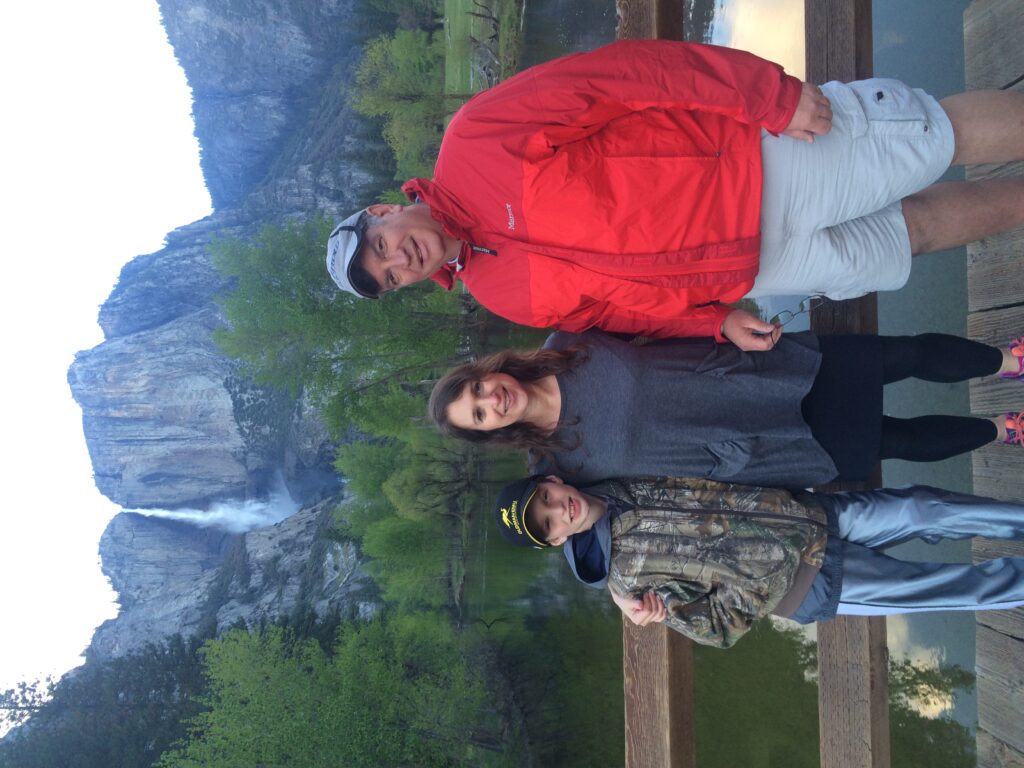
With special people at Yosemite. Can we imagine America without Yosemite? It takes money to protect these special places.
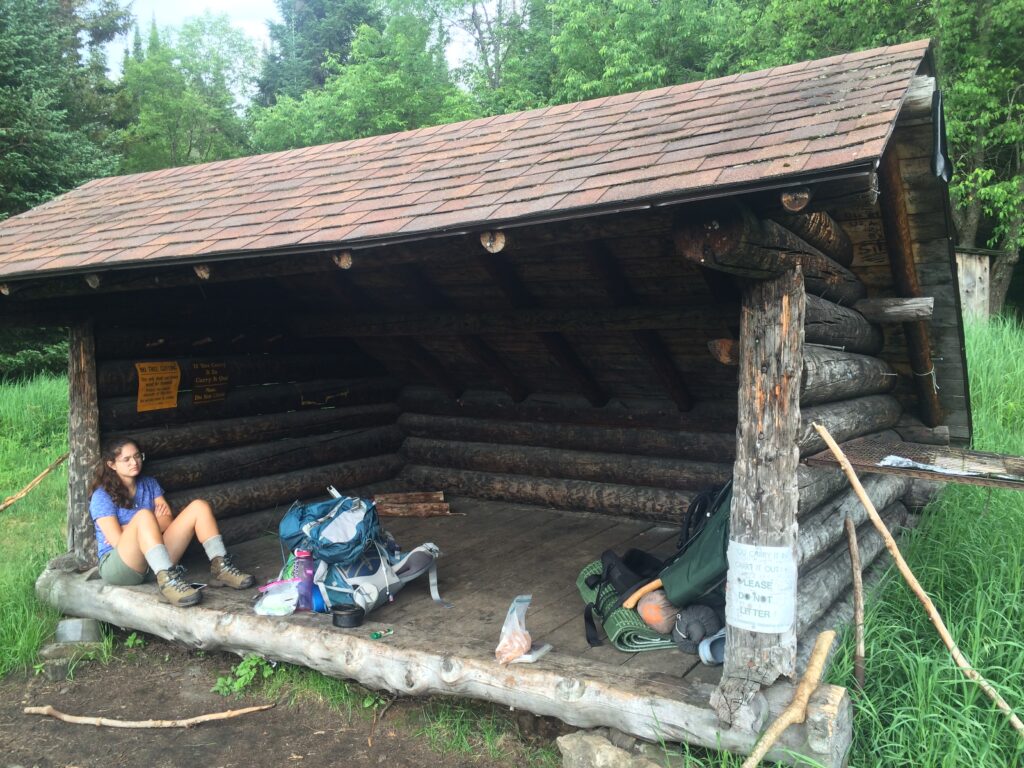
My daughter at the unhappy lean-to. But still, it was a functional, dry lean-to next to clean water in the middle of ADKs wilderness
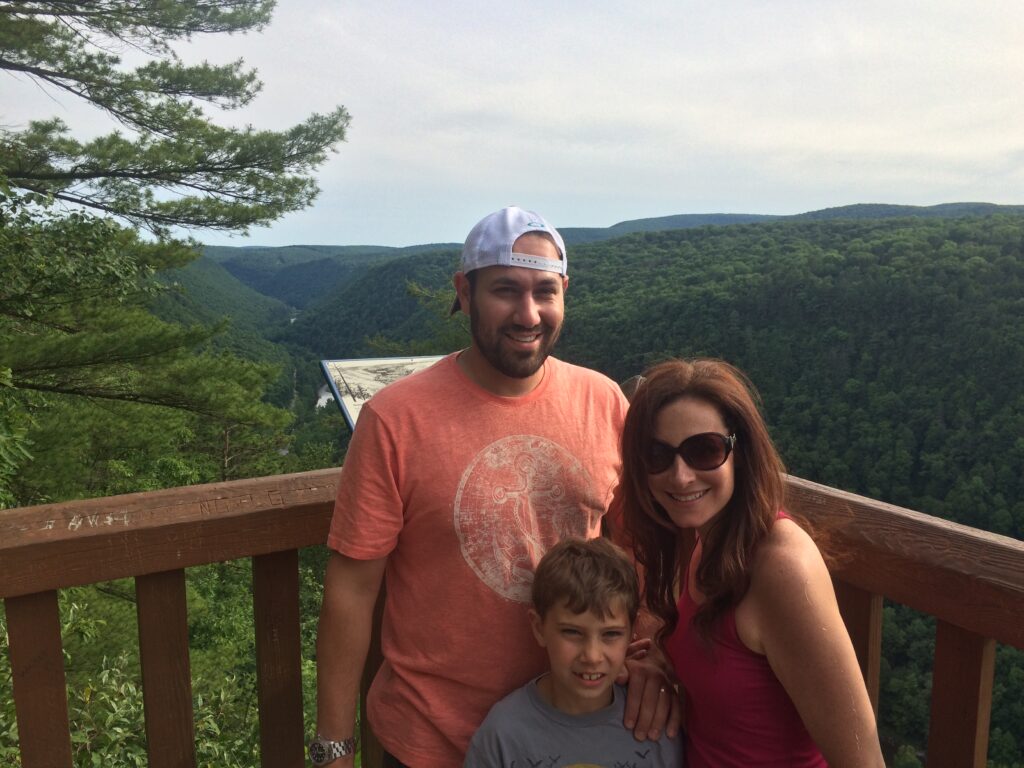
Our friends Mark and Amanda at Leonard Harrison State Park, overlooking the Pennsylvania Grand Canyon
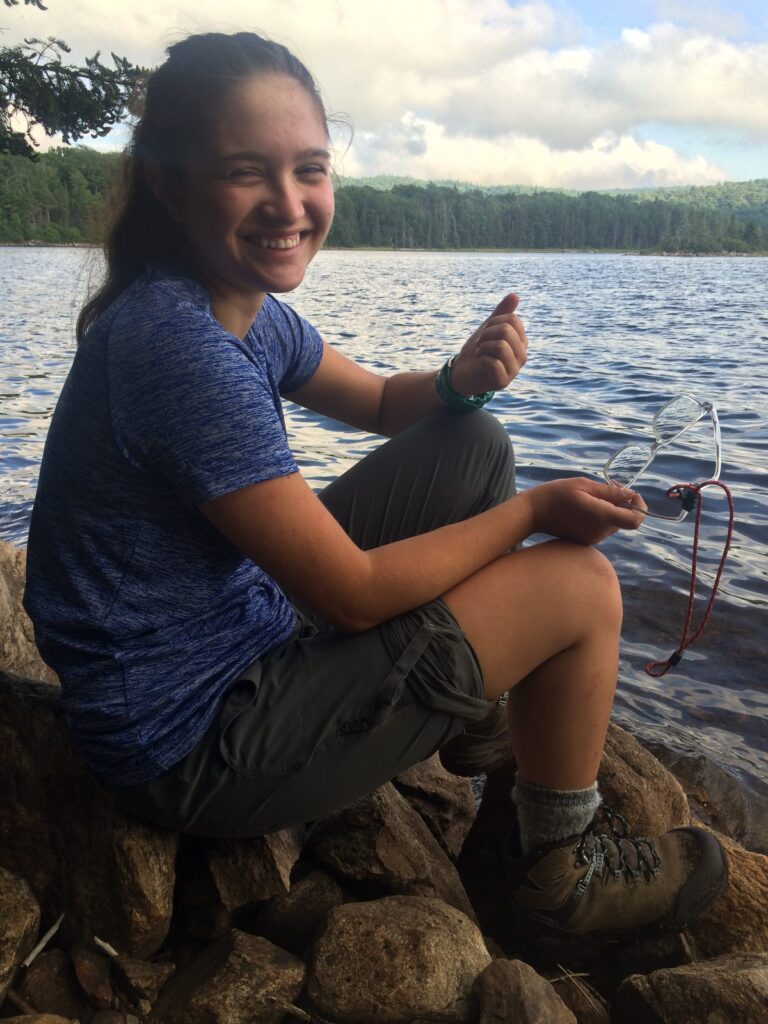
My daughter at Cedar Lakes, a special moment that spurred her on to teach wilderness backpacking to kids. Now she can’t wait to reach the area of no cell reception
Public Lands: Public good, public love
Someone named this September “Public Lands Month,” and while I have no idea who did this, or why they did it, I’ll take it nonetheless. Because like the vast majority of Americans, I totally, completely, absolutely love public land. Our public parks, forests, monuments, recreation areas, and wildlife management areas are one of the greatest acts of government in the history of human governments.
As a wilderness hunter, trapper, and fisherman, I truly love the idea of public land, and I love the land itself. No other place provides the lonesome opportunities to solo hunt for a huge bear or buck, either of which may have never seen a man before, or to take a fisher and a pine marten in a bodygripper or on a crossing log drowning rig, than public land.
If you want a representation of what is best and most symbolic of America, look to our public lands. They best capture the grandeur of America’s open frontier, the anvil upon which our tough national character was hammered and wrought. It was on the American frontier that Yankee ingenuity, self-reliance, and an indomitable hunger for individual freedom and liberty was born. And yes, while it was the Indian who reluctantly released his land to us, it was also the Indian who taught us the land’s value, so that we might not squander it, using it cheaply, profligately, and indiscriminately. Public lands are the antidote to our natural inclination to use land the same way we use everything else within our reach.
Some armchair conservatives argue that our public land is a waste of resources. That it is a bottled-up missed opportunity to make even more-more money, and if only we would just blow it all up, pave it all, dam it all, cut it all right now, etc, then someone somewhere would have even more millions of dollars in his pocket, and daggone it, he really wants those extra millions on top of the millions he already has in his pocket. When all our farmland is paved, that same armchair conservative will have nowhere to grow food to feed us, and apparently he will learn to eat dollar bills (he already thinks Dollars are what we survive on, anyhow, so it’ll be an interesting test of reality meeting theory).
But the truth is it’s mentally sick to talk about how much money you can get for selling your mother, or for selling your soul, which is what our land is, take your pick. Hunger for more money than a man knows what to do with, notwithstanding. But some things are just not worth valuing with money, and no number of payments of thirty pieces of silver will ever, ever amount to anything in comparison to what is actually in hand, our public land.
Others complain that public land is communism, but what do they say about the old English and New England commons, where villagers pastured their collected cows? Were our forebears who fought at Bunker Hill fighting for communism? You know they weren’t. Sometimes sharing isn’t a bad thing, and sharing some land is probably one of the best things. If Yosemite or Sequoia National Parks were privately owned, no one from the public would be there, right?
Americans are fortunate to have in their hand millions of acres of public land that they can access, from Maine to Alaska to Hawaii and everywhere in between. Little township and county squirrel parks, big state forests and parks, and vast national parks like the Appalachian Trail and Acadia are all magical experiences available only because they are public.
It is true that LaVoy Finicum was murdered in cold blood by out of control public employees over a legitimate debate with tyrannical, unaccountable public land managers in Oregon. But that is not the fault of the public grazing land there, any more than a murder can be blamed on the gun and not the man who pulled its trigger. We need to hold accountable those who screwed over Finicum and those who murdered him, not blame the land on which it all happened. Despite some failings by public land managers, of which Finicum’s murder is a great and sad example, public land remains one of the very few things that government actually does well and right almost all of the time. Corrective action is just one new administration away, as selected by the voters.
If you want to see untrammeled natural beauty for campers and hikers, or if you want to experience bountiful hunting lands for an afternoon or a week, then look to the public lands near you or far away from you. Everything else – nearly 100% of private lands – is either dead, dying, or slated for eventual execution at the hands of development.
We need a lot more public land in America. We need more to love in life, and nothing compares to loving a whole mountain range, a river, a field or a forest. It will love you back with nurture and sustenance, too.
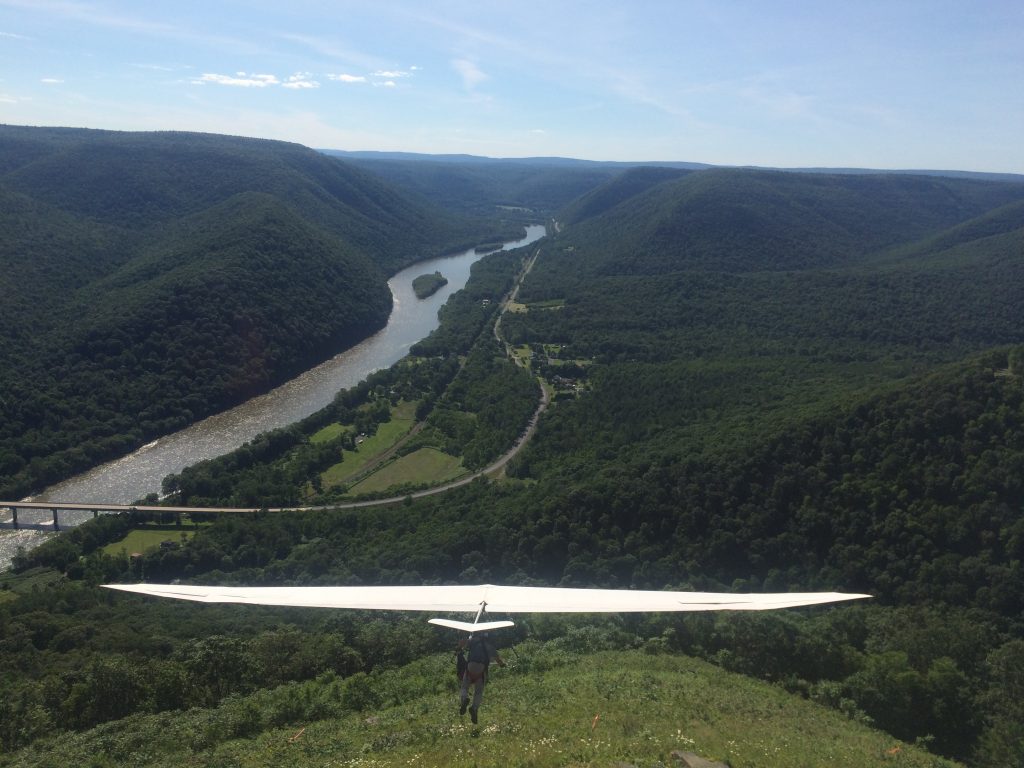
Hang glider leaps off of Hyner View State Park, surrounded by a couple million acres of Pennsylvania state forest and state parks
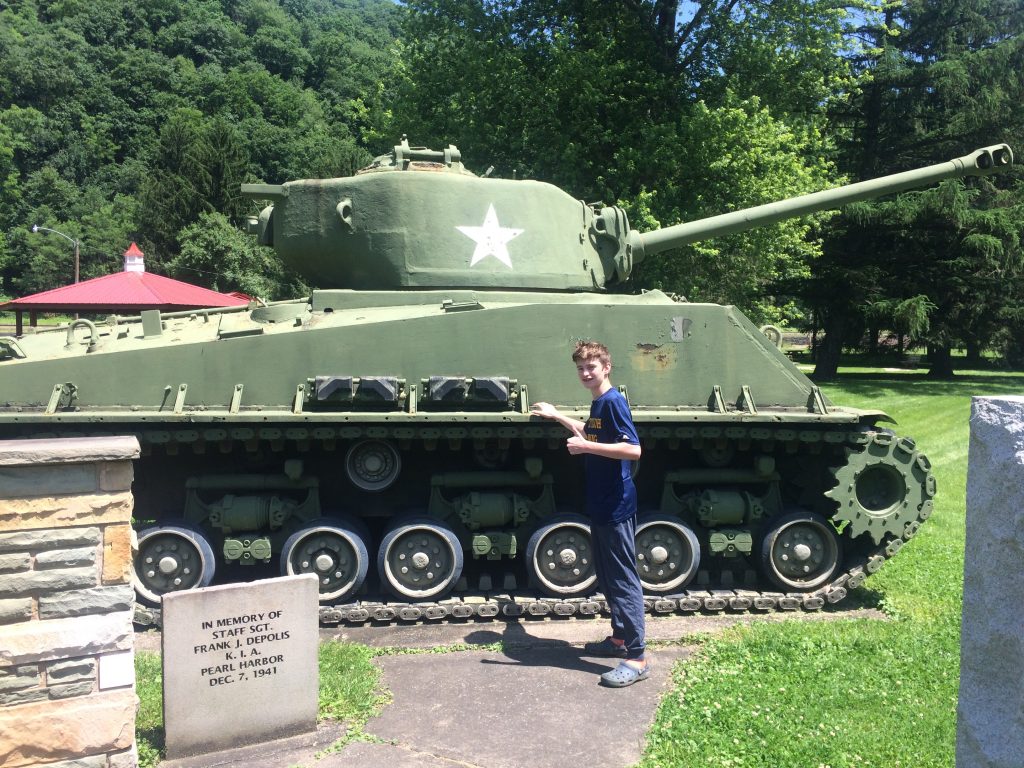
Down below Hyner View State Park is the Renova (Renovo) municipal park, with some historical artifacts from past freedom-ensuring conflicts, reminding the next generations of the sacrifices made so they can enjoy iPhones and Starbucks
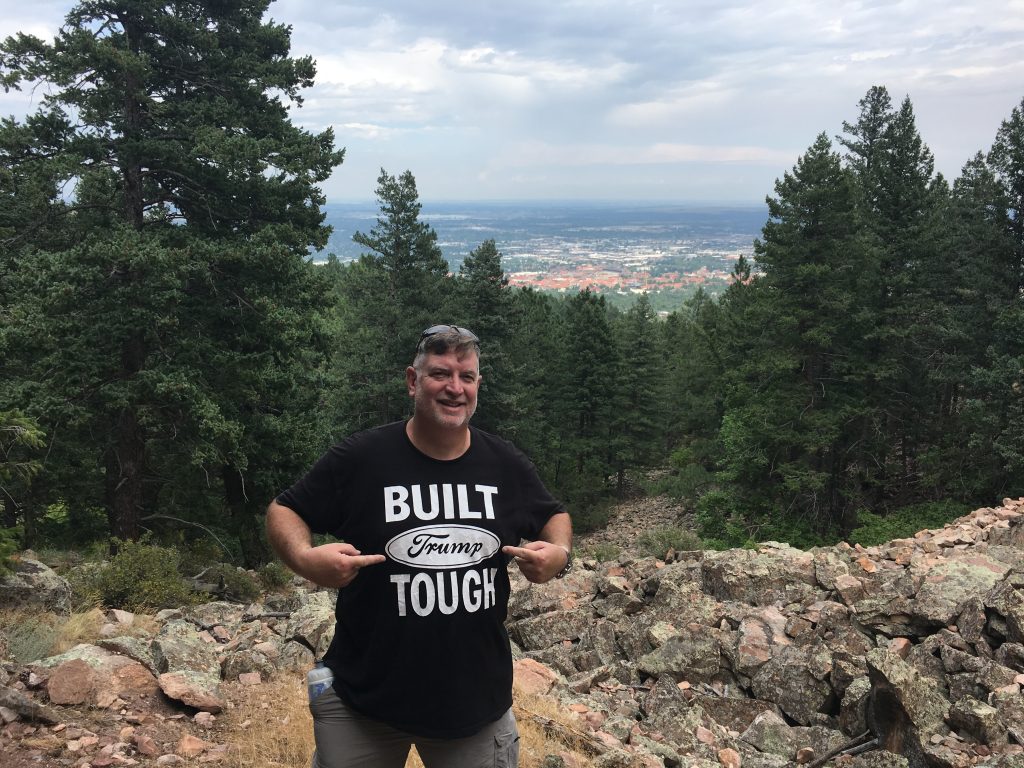
Yours truly standing high up in the Flatirons above super-liberal Boulder, Colorado, in the background, demonstrating “Trump Over Boulder” in case any hikers had missed the shirt. None had missed its presence there, by the way. Lots of public land here, enough for everyone to share, even Donald Trump! (and yes, there are a lot of boulders here in the photo).
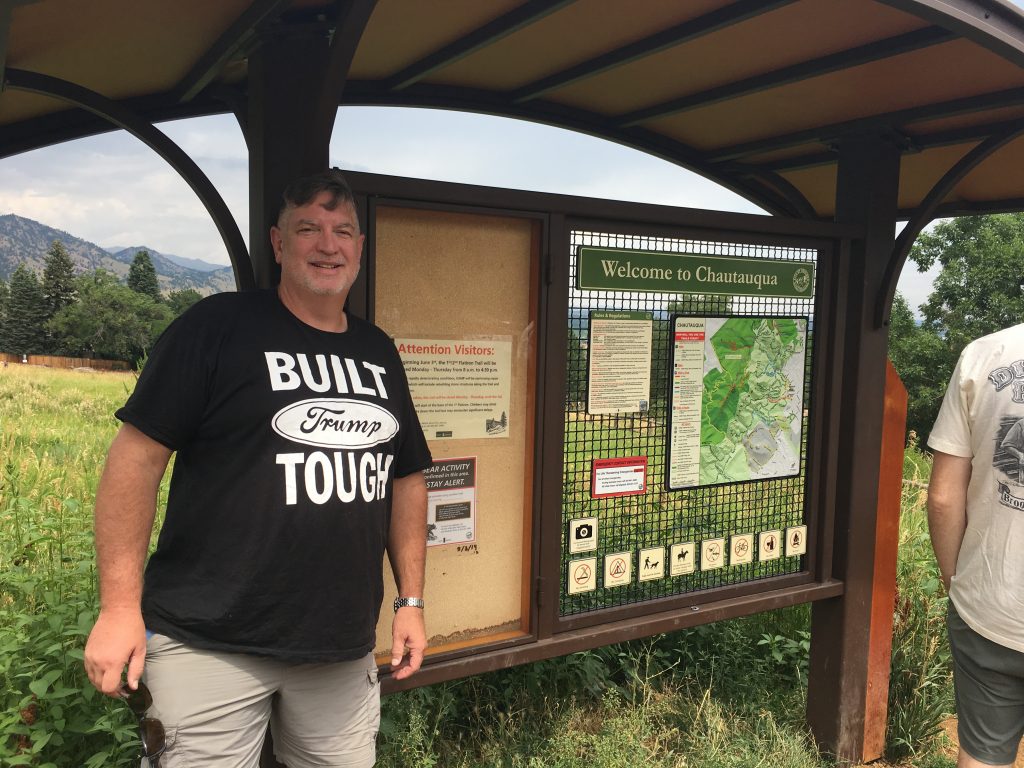
The author malingering around the Boulder, Colorado Chautauqua kiosk, silently taunting the invasive liberals gathered and passing through there. And in fact, the Trump shirt earned many double and triple-takes from fellow hikers, unused to experiencing diversity of thought. I did not bite those people, though I was tempted. Great public lands experience!
Does your kid have autism, ADD, ADHD? Nope. Modern society is what’s off, not your kid
For about 70,000 years (or 5,780 years for literal Bible believers) our species Homo Sapiens Sapiens has been on Planet Earth. In that time we have proven ourselves to be not only the dominant life form capable of killing everything else, but so good at killing that we are capable of killing ourselves, as well.
Over this long period of time, humans evolved as hunter-gatherers. We spent all our time hunting and gathering food, and we spent most of our time sitting around a camp fire eating meat we had hunted and fruits and herbs we had gathered. It is a lifestyle perfected by the American Indians and known to us today because we largely ended it through mass migration into their pristine Eden.
During the European conquering of America, very few Indians became European, most resisted to the death. The few who willingly adopted European clothing and religion can almost be counted on two hands. Indian schools like the one in Carlisle were renowned for runaways and coercive methods to convince little Indian children to adopt European ways.
On the other hand, many, many, really countless numbers of European Americans “went native.” They willingly sought out and joined with Indian tribes across the continent, wore their tribes’ clothing, spoke their language, adopted their habits and customs. This happened because something innately natural about the hunter-gatherer lifestyle powerfully speaks to the hunter-gatherer that is inside every human.
Even when it is covered by the thin veneer of “civilization” like today.
This is why people today still hunt, camp, hike, fish, seek wilderness etc. Our species evolved in these natural environments doing these exact activities, and these are the activities that are most natural to us humans today.
Look at it mathematically: For 65,000 of our 70,000 years on Planet Earth we humans were only hunters and gatherers; subsequently for 4,500 years we learned to farm and grow our food; then for 150 years following we became industrialized; for 125 years after that we have been eating out of a tin can and driving motorized vehicles; then for 100 years we have lived in the Information Age. Only in the past few decades have we lived as we currently do, in a massive consumer society driven by high sedentary living and complete materialism.
So 30 years divided by 70,000 years equals only 0.00042857% of human time on Planet Earth spent as we live today. This is to point out that our technology-heavy western lifestyle today, which we take for granted, is in fact not even a blip on the radar screen of human existence on the planet.
Which is to say, the hunter-gatherer lifestyle is most natural to us, it is hard-wired into us, and the iPhone-heavy digital lifestyle is totally new to our species. Our current lifestyle has a lot of costs that we do not yet understand, and yet we have embraced it in a death grip.
So when your beautiful child is “diagnosed” with autism, ADD, ADHD, etc., be skeptical. It is unlikely that there is anything actually wrong with your kid. What has happened is that our modern industrial, sedentary, virtual, digitized society has developed new standards for living and behavior, and for measuring success, that are completely at odds with how we evolved, how we are hard-wired, how we have lived most of our time on this globe, and how we need to be in order to be our most natural, most happy, most successful.
In a hunter-gatherer society, those young people who notice movement the quickest are not easily distracted. Rather, they are going to be the most successful hunters and warriors on a landscape where movement equals either food or danger, and those who see movement the fastest either live the longest or eat the most food. In that hunter gatherer environment, what we today call ADD is actually an important adaptive skill needed to survive.
So an “autistic” kid today who is obviously bright and technically gifted but socially quirky, was, five thousand years ago, probably the best flint knapping spear head maker in the tribe.
It is today’s Western society that is living at odds with our most human traits, long adapted and refined over tens of thousands of years, and only now considered to be liabilities in a physically weak, feminized, pacific, diabetes-riven technologically-based culture where food is served up by the unhealthy bucket-full with no effort required by the eater.
Got an autistic kid? Put him or her into a more natural setting, away from dominant society where they are mis-judged by unhealthy, unnatural material and behavioral standards, and watch them flourish. Even better, withdraw from it yourself!
Our public lands are not for sale
Apparently many Republicans are just downright jealous of all the craziness on the left, with all that destruction and removal of historic public monuments and the resulting revision of history to fit politically correct narratives.
So now we get a bunch of Republicans who actively pursue their own form of crazy, just bound and determined to undermine whatever electoral and public trust gains they have made in the past few years. Among a surprisingly wide circle of GOPers and conservatives, the selling off of public lands is a surprisingly popular policy goal.
Nothing hidden about this goal, the proponents of selling off public lands are quite open about their intentions. Apparently they want the public to watch them crash and burn, because the public is going to do that to them, electorally speaking.
Because the public overwhelmingly identifies with and passionately loves our public lands.
Maybe I am some sort of leftist kook, at least according to these proponents of public land sales, because I also sure do enjoy public parks, and public forests, and public recreation areas, public wilderness areas, and public hunting areas, and public monuments. Yes the government runs these places, and while I am not a big fan of government, public land management is one of the very few things that government tends to do pretty well..so..what can I tell you, this is a not-so-secret Communist plot: As an NRA life member, trapper, and lifelong hunter, I am proud to be part of this plot to “steal” Americans’ property rights, which is one of the ways that public land is described by advocates of bargain basement sales of public property.
Seriously.
Advocates of public land sales actually equate the existence of public lands with the diminution of private property rights.
Never mind that nearly all (my highly experienced guess is about 99.5%) public land has been purchased at fair market value from willing, even eager sellers, who love their land so much that they want to see it remain as wild, open, untamed places for wildlife and the wild people who pursue wildlife, and not turned into ubiquitous, dime-a-dozen cookie cutter asphalt and concrete jungles.
Never mind that in many remote areas, public land is an economic engine that keeps running, and running, and running without much expense.
Isn’t it ironic that the people who want to sell off public lands also want to stop and prevent people from selling their private land to wildlife and parks agencies? They bizarrely claim that public land’s mere existence is a de facto refutation of private property rights!
Oh c’mon! These armchair conservatives are the ones monkeying around with private property rights, when they try to stop sales of private land to public agencies.
They are “armchair conservatives” because these are people who do very little outside an air conditioned office. Maybe they ski at a ski slope with artificial snow as their outdoor lifestyle. But they do not hunt, trap, camp, canoe, fish, hike or do anything else indicating that red American blood flows in their veins. Nope, these are strictly dollars and cents on paper people, no real life experience. They’d sell you their grandma for ten bucks, too. No heart, no soul, just money money MONEY.
And that is how they see public lands: Easy money, easy development.
There is a useful story about money, I think it was about a mere thirty pieces of silver being accepted for giving up one’s soul. Something like that, with the point being that money and self enrichment isn’t our primary purpose in life, and that the people who singularly pursue these two goals are often soulless enemies of all that is good and wholesome.
Several weeks ago the Pennsylvania Supreme Court held that a local park could not be taken from the taxpayers and sold to a developer to build homes on. You’d think this is a plainly obvious forehead-slapping fact, but it demonstrates that the effort to liquidate public lands is not just a Western phenomenon, but an East Coast idiot parade, too.
Fortunately, the new US Department of Interior secretary does not believe in selling off public lands, unlike the other candidate who was on her way to being nominated before this issue tripped her up with the Trump Administration. The new Interior secretary, Ryan Zinke, is a retired Navy SEAL, hunter, and Western outdoorsman. He knows personally how important public land is to the identity of Americans everywhere.
Let’s hope Zinke can help his fellow Republicans wake the hell up on this issue, that our public lands are not for sale, before these fools get a good dose of electoral comeuppance from the American people who are barbequeing, hiking, biking, camping, fishing, and star gazing on public lands from sea to shining sea right now.
The empowered, independent feeling of eating less and doing much more
After ten days hiking through the Adirondacks’ most remote wilderness areas with our 18 year-old daughter, I had plenty of take-aways and contemplative thoughts that came home with me.
One of which was the empowered feeling of eating far less than I usually do, while performing at a far increased level than normally challenged. More on this in a moment.
Another take-away was that I am never too old to make mistakes, and one of the mistakes I made was taking an incredibly heavy pack on a rugged through-hike, where every extra ounce can make or break the trip.
My damned pack weighed 70 pounds and had everything but a Democrat in it. Some of that extra weight was due to Nina’s unusually specialized diet, due to a disease she has had all her life. We had to plan for every food contingency, within the constraints of great dehydrated trail food I make at home. Dehydrated means it weighs a lot less, keeps longer, and is limited to certain meats, fruits and vegetables. Nonetheless, the extreme weight really beat on my feet on the rugged downhills, and it slowed us down.
About that food: As I have typically experienced in all of my past days afield, hunger feels a lot different at the end of a tough day. A handful of salty nuts and a handful of sweet dried fruit is usually sufficient to make me feel full and put me soundly to sleep in the tent. Breakfast is usually a large cup of dark sweetened tea and either oatmeal with dried fruit and brown sugar, or the same cold dried fruits and nuts. Then I am off with my kit, about to burn another 10,000 calories.
The meals I eat on these trips are at most a couple hundred calories, so there is a tremendous imbalance between output and input. That results in an extreme burn of body fat, among other positive effects.
So I wonder why I feel the need to eat so much more, so much that is physically unnecessary, when I am at home, or at work, and I am not churning through huge caloric burns?
As I stink at pop psychology, not venturing into the guesswork of why any person, particularly Americans, enjoy over-eating / binging will prove a relief to us all.
But I will say this: What an empowered feeling it is, what a sense of independence I had, from hardly eating a thing, while literally moving a small mountain on my back many miles each day. Each day I was able to successfully plow through the East Coast’s most remote wilderness on just a handful of home-made jerky, some salty nuts (salt is a necessity for our bodies), and some home-made dried fruit.
In the spirit of Independence from want, or mere feelings of want, I am committing to eating a hell of a lot less every day than I used to, not because it makes me look better, but because it makes me feel a hell of a lot better, more empowered, more in control, like I have achieved more with less than expected. That is a very good feeling.
